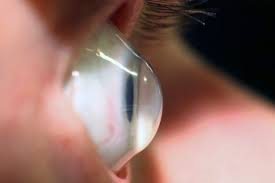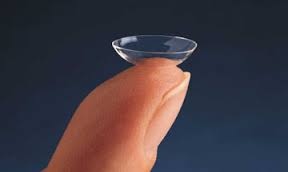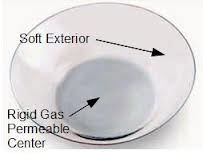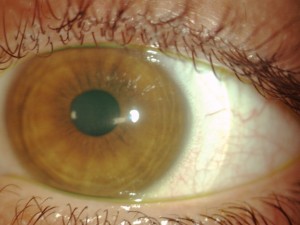Keratoconus & Contact Lens
People with early keratoconus typically notice a minor blurring of their vision and come to their clinician seeking corrective contact lens for reading or driving. At early stages, the symptoms of keratoconus may be no different from those of any other refractive defect of the eye. As the disease progresses, vision
deteriorates, sometimes rapidly. Visual acuity becomes impaired at all distances, and night vision is often poor. Some individuals have vision in one eye that is markedly worse than that in the other. The disease is often bilateral, though asymmetrical. Some develop photophobia (sensitivity to bright light),eye strain from squinting in order to read, or itching in the eye, but there is normally little or no sensation of pain. It may cause luminous objects to appear as cylindrical pipes with the s ame intensity at all points.
ame intensity at all points.
Contact lens
In early stages of keratoconus, glasses or soft contact lenses can suffice to correct for the mild astigmatism. As the condition progresses, these may no longer provide the person with a satisfactory degree of visual acuity, and most practitioners will move to manage the condition with rigid contact lenses, known as rigid, gas-permeable, (RGP) lenses. RGP lenses provide a good level of visual  correction, but do not arrest progression of the condition.
correction, but do not arrest progression of the condition.
In people with keratoconus, rigid contact lenses improve vision by means of tear fluid filling the gap between the irregular corneal surface and the smooth regular inner surface of the lens, thereby creating the effect of a smoother cornea. Many specialized types of contact lenses have been developed for keratoconus, and affected people may seek out both doctors specialized in conditions of the cornea, and contact lens fitters who have experience managing people with keratoconus. The irregular cone presents a challenge and the fitter will endeavor to produce a lens with the optimal contact, stability and steepness. Some trial-and-error fitting may prove necessary.
Keratoconus soft contact lens
There area Irregular Cornea correction with Silicon Hidrogel contact lenses specifically designed to fit irregular corneas one you can wear comfortably. While GP lenses are often used for this condition, some patients may experience limited wear time, glare and discomfort after only a few hours. the Keratoconus soft lens made in silicone hydrogel or hydrogel high DK for added comfort, and can be fully customized to fit the shape of keratoconic and post surgical corneas.
Hybrid contact lenses
Traditionally, contact lenses for keratoconus have been the ‘hard’ or RGP variety, although manufacturers have also produced specialized ‘soft’ or hydrophilic lenses and, most recently, silicone hydrogel lenses. A soft lens has a tendency to conform to the conical shape of the cornea, thus  diminishing its effect. To counter this, hybrid lenses have been developed which are hard in the centre and encompassed by a soft skirt. However, soft or earlier generation hybrid lenses did not prove effective for every person.Early generation lenses have been discontinued. The fourth generation of hybrid lens technology has improved, giving more people an option that combines the comfort of a soft lens with the visual acuity of an RGP lens.
diminishing its effect. To counter this, hybrid lenses have been developed which are hard in the centre and encompassed by a soft skirt. However, soft or earlier generation hybrid lenses did not prove effective for every person.Early generation lenses have been discontinued. The fourth generation of hybrid lens technology has improved, giving more people an option that combines the comfort of a soft lens with the visual acuity of an RGP lens.
Scleral lenses

Appointments
Prof. OLENT receives on appointment from Tuesday to Saturday from 9 to12,00 e from 15 to 19,00 oaclock.
Please reserve your visit or simply ask any information by sending an e-mail to :info@olent.it
or call to +39 011-541909 / +39 011-5611030.
Warnings: The Olent Ottica is a Optometric center that does not carry out Medical-Oculistic activity.Ottica Olent C.so Vinzaglio 26 – 10121 Torino (Italy)